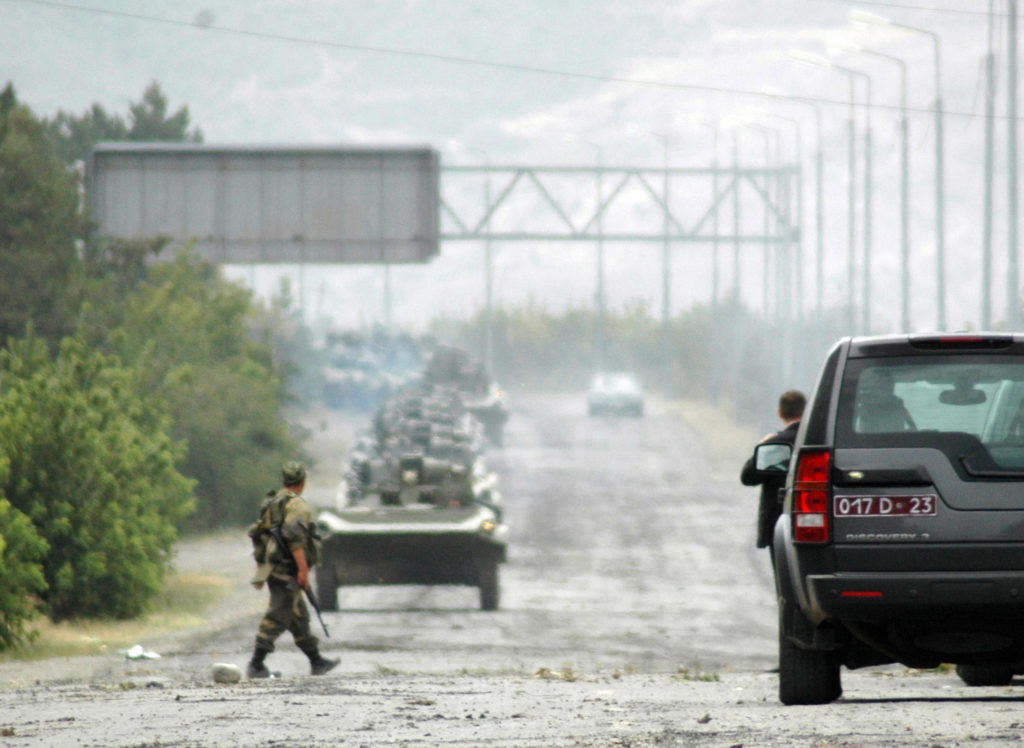The United States, along with allies close to Georgia, issued a statement on 12 August via its mission to the Organisation for Security and Co-Operation in Europe in Vienna.
The statement was a signal of support for the Caucasus country on the 13th anniversary of a 2008 ceasefire following a week-long war with Russia.
The short conflict ended with Russia fully in control of the South Ossetia region, from which 25,000 Georgians were ethnically cleansed.
“This statement is delivered on behalf of Bulgaria, Canada, Czech Republic, Estonia, Finland, Ireland, Latvia, Lithuania, Norway, Poland, Romania, Slovakia, Sweden, Ukraine, the United Kingdom, and the United States of America,” read the U.S. statement.
“We reaffirm our full support for Georgia’s sovereignty and territorial integrity within its internationally recognized borders.
“Thirteen years since the Russian military invasion of Georgia, we remain deeply concerned over the continued occupation of parts of the territory of Georgia and underline the need for the peaceful resolution of the conflict based on full respect for the U.N. Charter, the Helsinki Final Act and international law.
“We welcome Georgia’s compliance with the EU-mediated 12 August 2008 ceasefire agreement. We call upon the Russian Federation to fulfil immediately its clear obligation under the ceasefire agreement to withdraw its forces to pre-conflict positions, as well as its commitments to allow unfettered access for the delivery of humanitarian assistance and not to impede creation of international security arrangements on the ground. We call upon Russia to reverse its recognition of the so-called independence of Georgia’s Abkhazia and South Ossetia regions.”
Georgia cut relations with Russia after the conflict. The Kremlin keeps troops in both South Ossetia, now home to only about 20,000 people, and Abkhazia.
“We reiterate our deep concern over Russia’s military exercises and ongoing military presence in Georgia’s Abkhazia and South Ossetia regions”.
It was unclear what prompted the U.S. statement other than the war anniversary, or whether Washington was concerned by some possible flare up along the areas occupied by Moscow and Georgian government held areas.
But the statement was unusually long, perhaps signalling worry over more violent incidents, according to diplomats.
It is relatively normal for the U.S. mission to the OSCE to float statements via the organisation’s permanent council, which was the case on Thursday.
“We condemn Russia’s steps to unilaterally establish the Georgia-Russia state border…We urge Russia to reverse this process.
“We note the January 2021 judgment of the European Court of Human Rights in the case concerning the armed conflict between Georgia and the Russian Federation in August 2008 and its consequences including its findings that Russia has exercised effective control over Georgian regions of Abkhazia and South Ossetia following the 12 August 2008 ceasefire agreement, including through its military presence. The Court also ruled that Russia, in violation of the European Convention on Human Rights, tortured Georgian Prisoners of War; arbitrarily detained and killed Georgian civilians, and was responsible for their inhuman and degrading treatment; prevented the return of ethnic Georgians to their homes; and failed to conduct investigations into human rights violations. We call on Russia to fully comply with the European Court of Human Rights’ judgment, including by allowing internally displaced persons (IDPs) to return to their homes in safety and dignity.
“We are concerned over the ethnic discrimination against Georgians residing in Georgia’s Abkhazia and South Ossetia regions and human rights abuses, including severe violations of rights related to freedom of movement, residence and property, and destruction of the houses of internally displaced persons. We call on those in effective control to enable full and unhindered access by international human rights organisations to the Georgian regions of Abkhazia and South Ossetia.
“We are concerned by the intensified provocations by the Russian Federation…the ongoing installation of barbed wire fences and other artificial barriers along the administrative boundary lines (ABLs) of Georgia’s Abkhazia and South Ossetia regions, and by the lengthy closure of so-called ABL crossing points.
“These actions have destabilized the situation on the ground and severely impacted the security, safety, well-being, and humanitarian conditions of civilians in conflict-affected areas…
“The tragic deaths of civilians due to the closures of the so-called crossing points is an illustration of the grave consequences of the continuing restrictions on the freedom of movement for the local population.”

